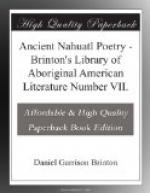1. xotlacueponi; the meaning of this compound is obscure. It is not found in the dictionaries.
2. The terminal o is inserted several times in the passage to express emotion and fill the metre.
mixitl tlapatl. A phrase signifying the stupor or drunkenness that comes from swallowing or smoking narcotic plants. See Olmos, Grammaire de la Langue Nahuatl, pp. 223, 228; oquiqueo is from i, to drink, or cui, to take, the o terminal being euphonic.
NOTES FOR SONG X.
The poet expresses his grief that his songs all dwell on painful topics; he exhorts his hearers of the vanity of fame and skill in handicrafts, and of the uncertainty of life; closing, he appeals especially to those of Tezcuco and Atecpan to listen and believe his warnings.
In spite of the introduction of the Spanish word Dios, and the exhortation to “believe,” in the last line, it is possible that the substance of this song was due to purely native inspiration; yet it may have been, like Song XIX, one of those written at an early period for the converts by the missionaries.
NOTES FOR SONG XI.
In a similar strain as in the last poem, the bard bewails the briefness of human life and friendships. He closes with an appeal to the Master of Life, of whom no mortal tongue can speak in worthy and appropriate terms.
6. ihuiti, apparently a form of ihuintia.
tonan; the reference appears to be to Tonantzin, Our Mother, otherwise known as Cihuacoatl, the Serpent Woman. She was the mythical mother of the human race, and dispensed afflictions and adverse fortune. See Sahagun, Hist. de la Nueva Espana, Lib. I, cap. 6. The name is a proof of the antiquity of the poem, which is throughout in the spirit of the ancient religion.
NOTES FOR SONG XII.
As stated in the Introduction (Sec. 10), a note prefixed to this song introduces it as a translation from the Otomi into the Nahuatl tongue. It admirably illustrates the poetic flexibility of the Nahuatl.
3. epoyhuayan, from epoalli, sixty; teoquauhtli ocelott, “divine eagles, tigers.” These terms refer to the warriors bearing these titles.
tlazomaquiztetl, “beloved, precious stones,” a figure of speech referring to the youths who go to war. The same or similar metaphors are used in previous songs.
5. The fifth and sixth verses present serious difficulties of construction which I do not flatter myself I have overcome.
NOTES FOR SONG XIII.
The inhabitants of Huexotzinco were in frequent strife with those of Mexico-Tenochtitlan, and on various occasions the latter captured many prisoners. The present poem is represented to be a composition of one of these prisoners when he and his companions were confined in Tlatilolco, one of the suburbs of Tenochtitlan. It breathes hatred against his captors and an ardent thirst for vengeance. The latest date at which I find captives from Huexotzinco detained in Mexico is 1511, and it is to this year, therefore, that I assign the composition of the poem.




